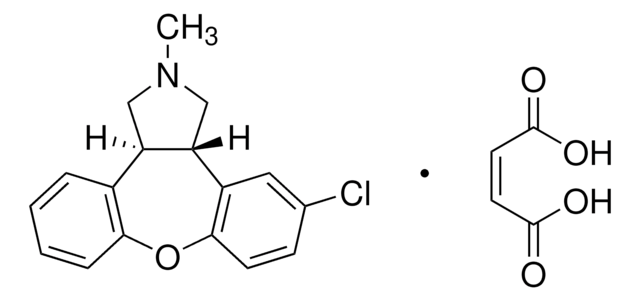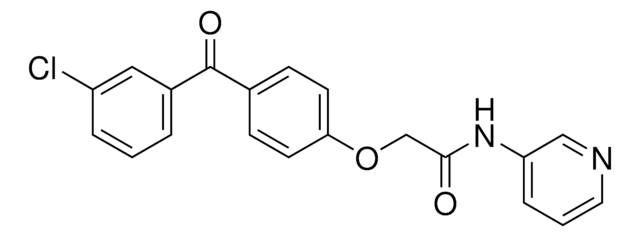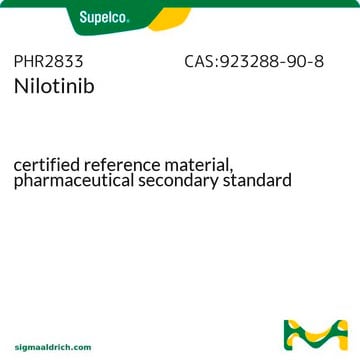S8072
Sertindole
≥97.5% (HPLC)
Synonym(s):
1-[2-[4-[5-Chloro-1-(4-fluorophenyl)-1h-indol-3-yl]-1-piperidinyl]ethyl]-2-imidazolidinone
About This Item
Recommended Products
Assay
≥97.5% (HPLC)
form
solid
color
off-white
solubility
DMSO: >10 mg/mL
H2O: <2 mg/mL
originator
Abbott
storage temp.
2-8°C
SMILES string
Fc1ccc(cc1)-n2cc(C3CCN(CC3)CCN4CCNC4=O)c5cc(Cl)ccc25
InChI
1S/C24H26ClFN4O/c25-18-1-6-23-21(15-18)22(16-30(23)20-4-2-19(26)3-5-20)17-7-10-28(11-8-17)13-14-29-12-9-27-24(29)31/h1-6,15-17H,7-14H2,(H,27,31)
InChI key
GZKLJWGUPQBVJQ-UHFFFAOYSA-N
Gene Information
human ... ADRA1A(148) , ADRA1B(147) , ADRA1D(146) , DRD2(1813)
Application
Biochem/physiol Actions
Features and Benefits
Signal Word
Warning
Hazard Statements
Precautionary Statements
Hazard Classifications
Aquatic Chronic 4 - Eye Irrit. 2 - Skin Irrit. 2 - STOT SE 3
Target Organs
Respiratory system
Storage Class Code
11 - Combustible Solids
WGK
WGK 3
Flash Point(F)
Not applicable
Flash Point(C)
Not applicable
Personal Protective Equipment
Certificates of Analysis (COA)
Search for Certificates of Analysis (COA) by entering the products Lot/Batch Number. Lot and Batch Numbers can be found on a product’s label following the words ‘Lot’ or ‘Batch’.
Already Own This Product?
Find documentation for the products that you have recently purchased in the Document Library.
Articles
We offer many products related to dopamine receptors for your research needs.
We offer many products related to serotonin receptors for your research needs.
Our team of scientists has experience in all areas of research including Life Science, Material Science, Chemical Synthesis, Chromatography, Analytical and many others.
Contact Technical Service









